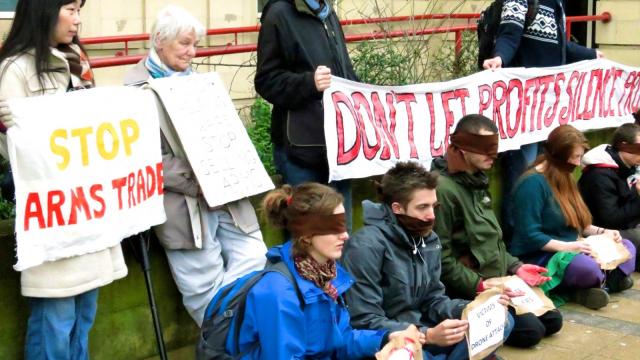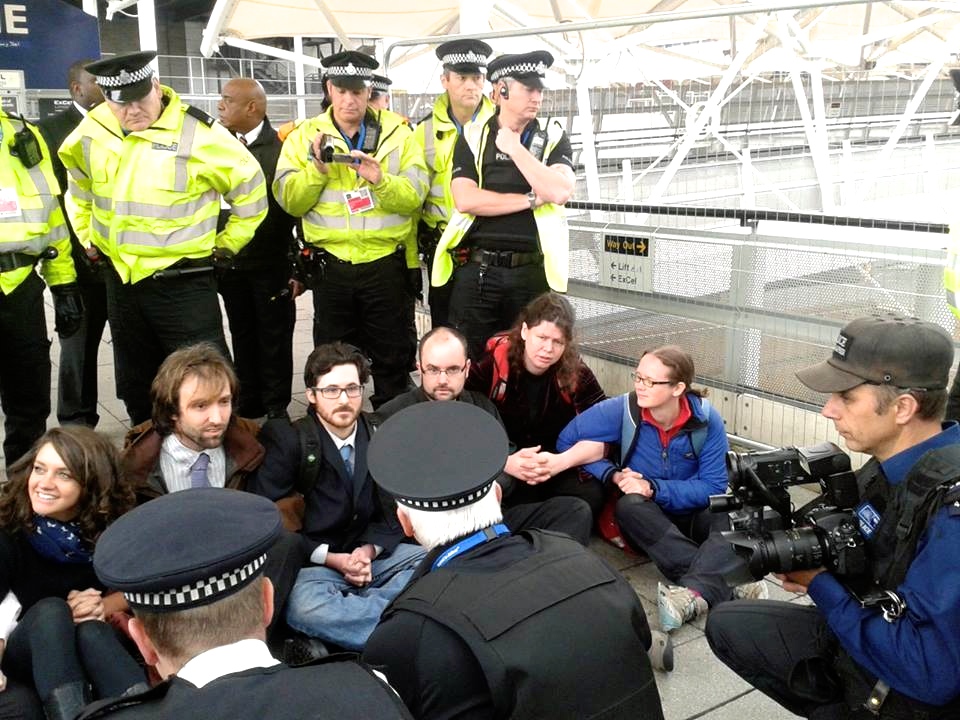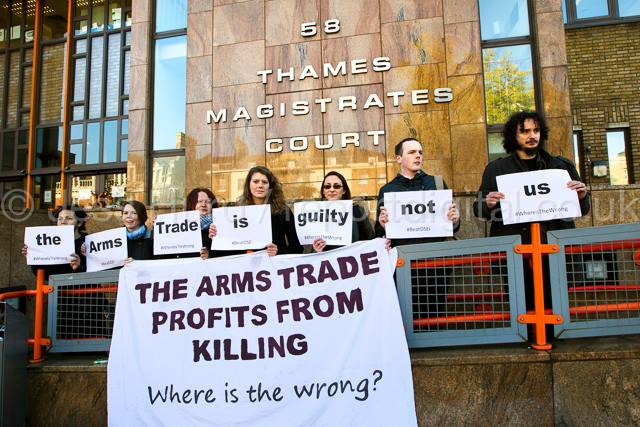
As police surrounded Daniel Ashman at the biennial Defence Security and Equipment International (DSEi) Arms Fair in September 2013, he shouted about how the event enables the “indiscriminate killing of innocent people.” Like past fairs, there was a heavy police operation focused on preventing disruption by protest and direct action.
Ashman was sitting in the road, blocking weapons from being transported into the Excel Center, weapons he alleges could be used by oppressive regimes. Video footage obtained by Occupy.com also shows Ashman decry “genocide” and “war crimes” as he is arrested and bundled to the floor.
Charged with willfully obstructing a highway, Ashman is asserting lawful necessity — a legal argument that allows you to break laws to uphold or prevent far worse crimes. He will answer the charges on July 4, unless the Crown Prosecution Service (CPS) drops the case. He is representing himself in court.
“It was clear that the police were there to facilitate the arms fair going ahead,” Ashman told us. “We appealed to them to recognize that the weapons on display will oppress and kill people around the globe — men, women and children, people that are no threat at all. They will see no recourse for justice and no remedy for the crime that will, as things stand, inevitably be or has been committed against them.”
Ashman’s lawful necessity legal strategy is similar to lawful excuse, which has a growing body of cases within British law. In effect, it can allow people arrested for direct action to bring the ethics of what they oppose into court. Using this defense, activists have been acquitted of criminal damage on the basis that it will prevent worse crimes. In 1996, activists were acquitted after destroying BAE Hawk Jets destined for the repressive Indonesian Suharto regime in 1996. The same law allowed women to sabotage British nuclear submarines in 2000, and a group to destroy a weapons factory in 2010, with its weapons destined for Israel.
Additionally, it justified an occupation of a coal fire station as a direct action against climate change in 2008, and allowed Greenpeace activists to destroy a field of GM crops in 2000.
Directly related to the arms fair, a court recently acquitted five Christian activists arrested on the first day of the fair and charged with aggravated trespass; they had super-glued their hands together in prayer. Their trial collapsed on a legal technicality.
Ashman was arrested during the Occupy vs. The Arms Fair, which targeted the setting up of the fair. Unlike Ashman, other activists arrested in the event have had their cases dropped. In a statement following the decision, the group represented by Hodge, Jones and Allen stated: “It seems the case against us was dropped as the authorities did not want to deal with our questions.”
With his legal process in its earlier stages and still active, Ashman has the opportunity to pose these questions and rely on similar evidence. Specifically, he wants to challenge the British authorities’ emphatic support for the arms industry, which includes co-organizing the arms fair.
“The legal authorities were turning a blind eye to crimes,” Ashman claims. “The remit of the law enables a certain culture to facilitate or be complicit in the act of crimes of humanity with no enforceable consequences. Consequently, the sanctity of life is not respected and innocent people are murdered.”
DSEi has consistently broken laws by selling torture equipment. These cases include reports by Amnesty International in 2011, in theTelegraph in 2007, and in [Parliamentary records](http://www.newstatesman.com/node/151600http://www.publications.parliament.uk/pa/cm200506/cmselect/cmquad/873/87...) in 2005.
The arms fair also broke international laws when it sold banned weapons in 2011 and 2009, and landmines during the 2007 fair.
It also sells weapons to regimes known to commit human rights violations. The 2013 guest list included Bahrain, Saudi Arabia and a weapons manufacturer that [supplies Syria] (http://www.huffingtonpost.co.uk/2013/09/05/arms-control-syria_n_3864687....). Dealing these weapons to oppressive regimes violates international law, including the Geneva Convention Act, European conventions, United Nations Commission [statutes] (http://deoxy.org/wc/wc-nurem.htm) and the Oslo Accords on landmines.
Broadly, these international laws and treaties are given jurisdiction in British courts by the International Criminal Court Act of 2001. It defines it a criminal offense “to act in conduct ancillary [in support] to war crimes or crimes against humanity.”
In the face of this evidence, prosecutors dispute that there were illegal weapons sales at DSEi. This is contradicted by an expert witness statement signed by Oliver Sprague. He is program director of arms control and policing for Amnesty International UK.
“The DSEi defense exhibition has repeatedly failed to stop breaches of 2008 UK Export Control order 2008, including at DSEi 2008,” he writes in a statement Ashman has presented as evidence. Verifying this, arms dealers were ejected in DSEi 2013 for selling torture equipment after an MP revealed the work of research activists.
Another surprise within the prosecution’s case was that they did not know what was in the coach that Ashman blocked, or in the other vehicles Ashman was preventing from entering the conference center. From a legal perspective this point is important; it is not only illegal to sell weapons such as torture equipment, landmines or cluster bombs: advertising these weapons, for instance in brochures, is equally unlawful.
Although Ashman will rely on the witness statement from Sprague, the three magistrates denied him the right call him as a witness. They also rejected Ashman’s request to summon MP Caroline Lucas, whose emergency announcement in Parliament led to the torture equipment vendors' expulsion; Vince Cable, the government’s Business Secretary and expert Andrew Feinstein.
The panel of three magistrates said: “These people deal with matters that the court has no justification to make any decisions on. It is for Parliament to change the law.”
“Vince Cable is an important player in the illegal activity and has oversight duty on all the sales made at the fair,” Ashman replies, when I ask why he wanted him in court. “As U.K. Business Secretary, he signs off on weapons trade deals that are connected to human rights abuses, including in Saudi Arabia, Israel and Bahrain. Their criminality has been acknowledged on an international level, but this needs to be recognised and dealt with in Britain’s courts.”
Ashman showed me email correspondence with his MP and Cable. This confirmed Cable is the "statutory licensing authority" for arms deals. It also reveals Cable rejected the request to be a witness in court, stating, “I am afraid it would not be appropriate to attend his court hearing.”
“The law is acting as a barrier to implementing real justice in terms of international law,” Ashman said, describing his opinion that the arms industry is neglected by British law. “Contrary to strong compelling evidence, the British legal system is instead supporting the current system, in which Britain can maintain its economic power through violence and dominance, such as arming its allies that are often abusive regimes.”
3 WAYS TO SHOW YOUR SUPPORT
- Log in to post comments













